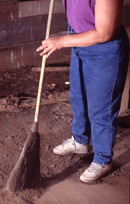|
How Is Hantavirus Transmitted?
In the United States, deer mice (along with cotton rats and rice
rats in the southeastern states and the white-footed mouse in the
Northeast) carry hantaviruses that cause hantavirus pulmonary syndrome.
Learn
more about the rodent carriers of HPS.
Rodents shed the virus in their urine, droppings, and saliva. The
virus is mainly transmitted to people when they breathe in air contaminated
with the virus.
 When
fresh rodent urine, droppings or nesting materials are stirred up,
tiny droplets containing the virus get into the air. This process
is known as "aerosolization." When
fresh rodent urine, droppings or nesting materials are stirred up,
tiny droplets containing the virus get into the air. This process
is known as "aerosolization."
There are several other ways rodents may spread hantavirus to people:
- If a rodent with the virus bites someone, the virus may be spread
to that person-but this type of transmission is rare.
- Researchers believe that people may be able to get the virus
if they touch something that has been contaminated with rodent
urine, droppings, or saliva, and then touch their nose or mouth.
- Researchers also suspect people can become sick if they eat
food contaminated by urine, droppings, or saliva from an infected
rodent.
These possibilities demonstrate why disinfecting rodent-infested
areas is so important in preventing transmission of the virus. Transmission
can happen any place that infected rodents have infested. This could
include barns, sheds, or other outbuildings, warehouses, and summer
cottages that have been closed up for the season. Carrier rodents
can infest homes as well. Therefore, the most sensible way to avoid
contact with infected rodents is to prevent rodents from infesting
the places where you live and work and to follow safety precautions
if you do stumble into a rodent-infested area. The prevention
section of this Web site details this information.
Can You Get Hantavirus from Another Person?
The types of hantavirus that cause HPS in the United States cannot
be transmitted from one person to another. For example, you cannot
get the virus from touching or kissing a person who has HPS or from
a health care worker who has treated someone with the disease. You
also cannot get the virus from a blood transfusion in which the
blood came from a person who became ill with HPS and survived.
Can You Get Hantavirus from Animals Other Than
Rodents, or from Insects? What About Pets?
No-the hantaviruses that cause HPS in the United States are not
known to be transmitted by any types of animals other than certain
species of rodents. You cannot get hantavirus from farm animals,
such as cows, chickens, or sheep, or from insects, such as mosquitoes.
Dogs and cats are not known to carry hantavirus; however, they may
bring infected rodents into contact with people if they catch such
animals and carry them home. Guinea pigs, hamsters, gerbils, and
rodents from pet stores are not known to carry hantavirus.
|

 National
Center for Infectious Diseases
National
Center for Infectious Diseases National
Center for Infectious Diseases
National
Center for Infectious Diseases